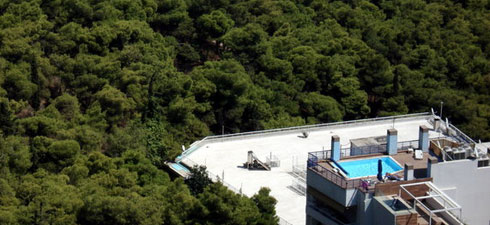When Nikolaos Logothetis (57), a tall Greek with a well-trimmed full beard and professorial spectacles, talks about numbers, it sounds like a love poem. "The science of statistics has a language all its own,” he says. "We need only listen closely if we want to grasp the cause of our country’s illness.” That’s a remarkable thing to say in the land of whitewashed figures. Logothetis, appointed deputy chief of the new and independent statistical office just a few hours ago, is sitting in a classy Athens restaurant expounding on his plans to shake up the whole department. "In future we will only report to parliament and we’ll finally be able to work as an independent scientific institution."
"Greek statistics" is a new buzzword. It stands for political wheeling and dealing and creative accounting, for the whole sad Greek saga and the statistical castles in the air constructed by Logothetis' predecessors – one of whom has since absconded abroad. On behalf of the European Union, the International Monetary Fund (IMF) and the European Central Bank (ECB), the so-called troika (one Dane, one Belgian and one German) are back in the country to re-assess whether Papandreou’s government has made sufficient efforts to warrant another €9 billion tranche of transfers to Athens in September.
Helicopters over posh suburbs of Athens
And a second man has been called in to give Athens a new lease of life: Ioannis Kapeleris, head of the SDOE tax investigation agency set up in December. Kapeleris (50) is one of the busiest men in the government these days. Visibly sleep-deprived in his wide-open unbuttoned shirt, he receives visitors with a cigarette in one hand, a coffee cup in the other. "Check this out,” he says and whips out an Excel table. "Here you see how many cases of tax fraud in the Athens tourist industry the Greek state managed to prove in June 2009: 506. And you know how many we found in June 2010? 4340."
His staff have become remarkably resourceful in tracking down tax evaders. They helicopter over the posh suburbs of Athens filming the estates of doctors, lawyers and businessmen. Using satellite images to locate country houses and properties, they have found out that the suburbanites own 16,974 swimming pools, a sight more than the 324 officially declared. "We make sure to net not just the small fish, but the big ones, too,” says Kapeleris. The SDOE is supposed to chase down at least €1.2 billion for 2010: in the first six months, the taxmen have already rustled up over €1.8 billion.
Is 700 and 1400 euros in pay privileged?
In an interim report, the IMF approvingly notes “appreciable headway” towards balancing the national budget – chiefly in the form of swingeing cuts in pay and pensions. But the comptrollers are likely to keep the pressure on premier Papandreou: Athens has absolutely got to curb the costs of the Greek health care system, liberalise its labour and energy markets and privatise its “lame ducks”, i.e. big-time loss-making state-owned companies.
And that is bound to kindle a conflagration. Last week tanker drivers protested against the EU’s moves to open up their occupational ranks. A marginal note? Well, the chaos at Greek petrol stations provided just a little foretaste of the wave of strikes due to inundate Greece over the next few weeks. Kostas Papantoniou, vice-president of the civil servants union, foresees much rougher waters yet ahead for the government. "They say Greek civil servants cost too much,” says Papantoniou, "but that’s hardly true. 80 per cent of us earn between 700 and 1400 euros in take-home pay. You call that privileged?"
The coming cutbacks
Many of them will be hard hit by the coming cutbacks. The public sector personnel retiring this year are liable to be among the angriest in officialdom. They are actually entitled to a lump-sum payment from the civil service coffers into which they’ve been paying for decades – on average, some €40,000. But to lighten the load on the national budget, the government has opted for a temporary stop to the payments: the IMF and EU ferrets are not supposed to find the public coffers empty. VAT refunds to businesses and employee compensation for the privatisation of their companies have seen the same fate.
In other words, the so miraculously minified budget deficit with which Papandreou’s government aims to impress the EU and IMF could involve another round of highly creative accounting. And a replay of those “Greek statistics".
(Translation - Eric Rosencrantz)
Was this article useful? If so we are delighted!
It is freely available because we believe that the right to free and independent information is essential for democracy. But this right is not guaranteed forever, and independence comes at a cost. We need your support in order to continue publishing independent, multilingual news for all Europeans.
Discover our subscription offers and their exclusive benefits and become a member of our community now!












